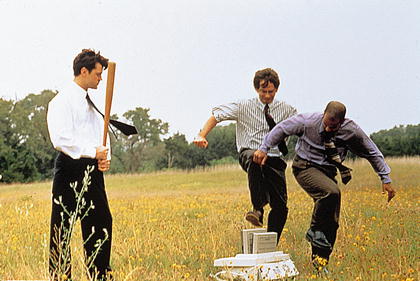J-Red's post below got me thinking about Internet gambling and all the new rules on getting money into and out of accounts. He joked that pre-paid phone cards were the only acceptable method of funding an account, but I think that's easier than the real alternatives.
From what I understand of the legislation passed last year, the best way around the law is to set up an offshore bank account (most people suggested England), then transfer funds from your US account to the British account, and fund your sports betting account from there. Easy enough.
... wait a minute, that doesn't sound right. In order to make my (hypothetical) $5 bets on NFL games, I need an offshore bank account? I need to learn the basics of low-level money laundering? So sports betting is just fine in Vegas, but if you want to do it over the Internet, you need Al Capone's accountant.
Sure, there are alternatives like Neteller and other foreign payment processors that act as loopholes. But essentially, this is still money laundering. You're trying to disguise the endpoint of a financial transaction by funneling it through a series of steps.  Remember the scene in Office Space, where the guys talk about laundering their stolen money, only to realize that none of them have any idea how actually launder money? Thanks to Congress, an entire generation of sports fans are now amateur money launderers.
Remember the scene in Office Space, where the guys talk about laundering their stolen money, only to realize that none of them have any idea how actually launder money? Thanks to Congress, an entire generation of sports fans are now amateur money launderers.
Here's the worst part about all this - everyone could be happy. Right now, most online sports books operate in third world countries (Bodog, which would be the official online gambling site of ECB if online gambling were legal, operates in Costa Rica). How much added cost do you think is associated with housing operations outside the US? Bodog has to get its (mostly American) handicapping experts to move down to Costa Rica. It also has to spend absurd amounts of money on security for its compound.
Here's a proposal: why doesn't Congress allow Internet sports betting, and then tax the hell out of it. Even with a 20% corporate tax on Internet gambling companies, the companies would still come out ahead by moving their operations stateside. Who loses out in that scenario? Only the teetotalers. For them, I have another question: what's the difference between slot machines and scratch-offs?
July 5, 2007
The State of Online Gambling
Popular destinations
- Aviator Gioco
- Non Gamstop Casinos
- UK Casinos Not On Gamstop
- Non Gamstop Casino
- Non Gamstop Casino
- UK Online Casinos Not On Gamstop
- Lista Casino Non Aams
- Non Gamstop Casinos UK
- Online Casinos
- Best Non Gamstop Casinos
- Non Gamstop Casino Sites UK
- Non Gamstop Casinos
- Casino Sites Not On Gamstop
- Non Gamstop Casinos
- オンラインカジノ
- Gambling Sites Not On Gamstop
- Migliori Siti Casino Non Aams
- Casino En Ligne Fiable
- UK Casino Not On Gamstop
- Betting Sites
- Non Gamstop Casino UK
- Siti Di Casino Non Aams
- Migliori Casino Online Italia
- Casino Non Aams
- Meilleur Casino Crypto
- Casino En Ligne Crypto
- Site Paris Sportif Belgique
- Paris Foot Belgique
- Migliori Siti Casino Online
- Casino Non Aams
- Casino Retrait Instantané
- Paris Sportif Hors Arjel
- ライブ カジノ
- 出金早い オンカジ
- Migliori Siti Scommesse
- Site De Casino En Ligne
- Casino En Ligne Avis
- Meilleur Casino En Ligne
- Casino En Ligne Français
- Lista Casino Online Non Aams
Contributed by
Brien
at
7/05/2007 08:10:00 AM
![]()
Tag That: Al Capone, Bodog, Degenerate Gambling, Money Laundering, Office Space, Pre-paid Phone Cards
Summer is here and there's never been a better time to try your hand at online sports betting. Place your bets on your favorite horse with horse racing or even try your luck with your favorite football team. Enjoying sport is just a click away!
Subscribe to:
Post Comments (Atom)

5 Responses:
A 20% tax would mean we all lose. Where do you think that 20% is going to come from? It sounds kind of like investing, where you need to make enough to come out ahead after taxes and inflation. I'm not THAT good at picking against the spread.
The tax comes out of Bodog's reduced overhead. Bodog saves money by moving stateside, and the government takes some of that savings in taxes. I'm not talking about a transaction tax on each bet, but a higher tax on corporate profits than other companies get.
Actually, the savings in lobbyists might be enough to offset 20%. I could see that working.
Great blog, take a look at some of my preferred sites for slots and video slots, casino, play bingo online and bingo online. Or if you prefer the casino games section (my personal favorite) then this is for you. Great of you to take the time to check these sites if you love Keno, Mah Jong and other casino online games.
Some of these sites can be in a foreign language like Norwegian, slots and online casino games with video slots.
Free Mah jong, Mah jong solitaire, internet bingo and Bingo games, slots and online slots games.
Thanks for your time, be well!
In my opinion, Gambling is something that every human being has the right to do, and politicians should keep their noses out of what people do for entertainment or within the comfort of their own homes.
Post a Comment